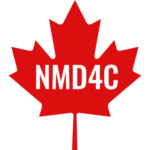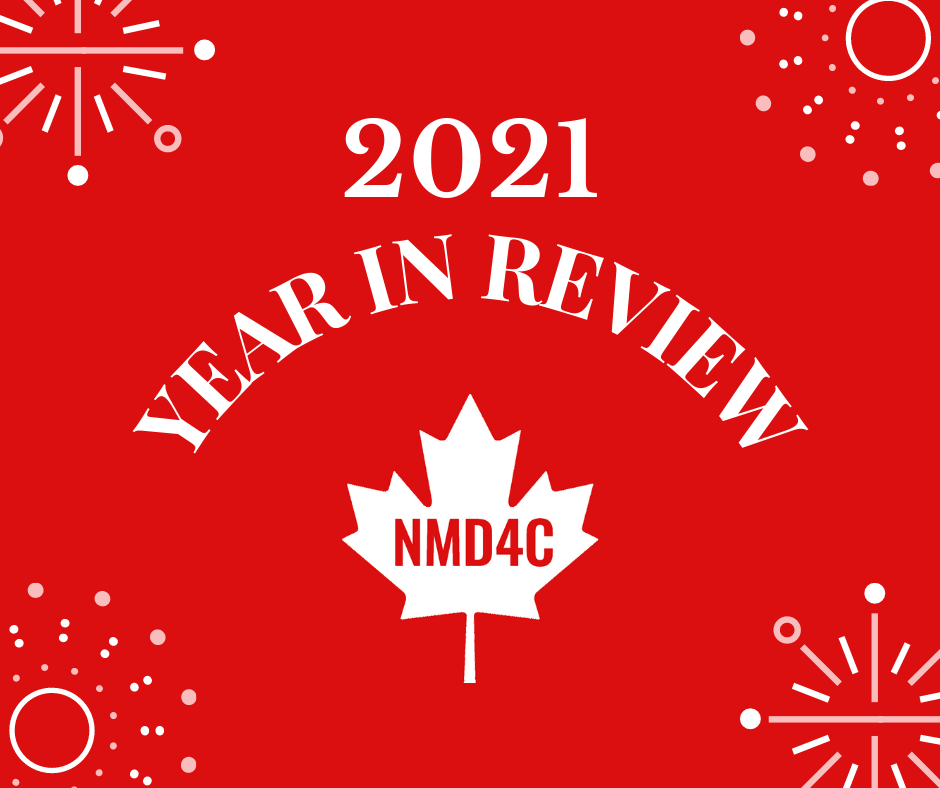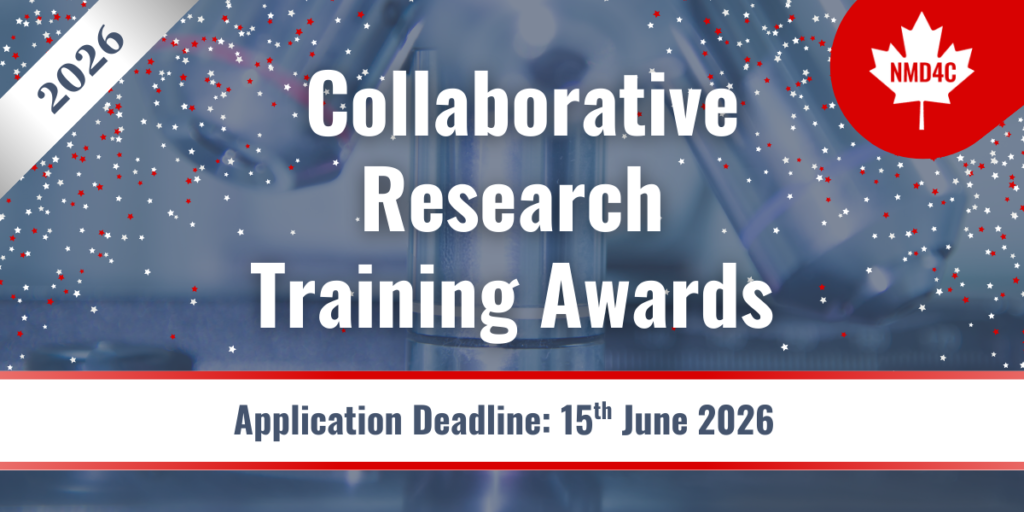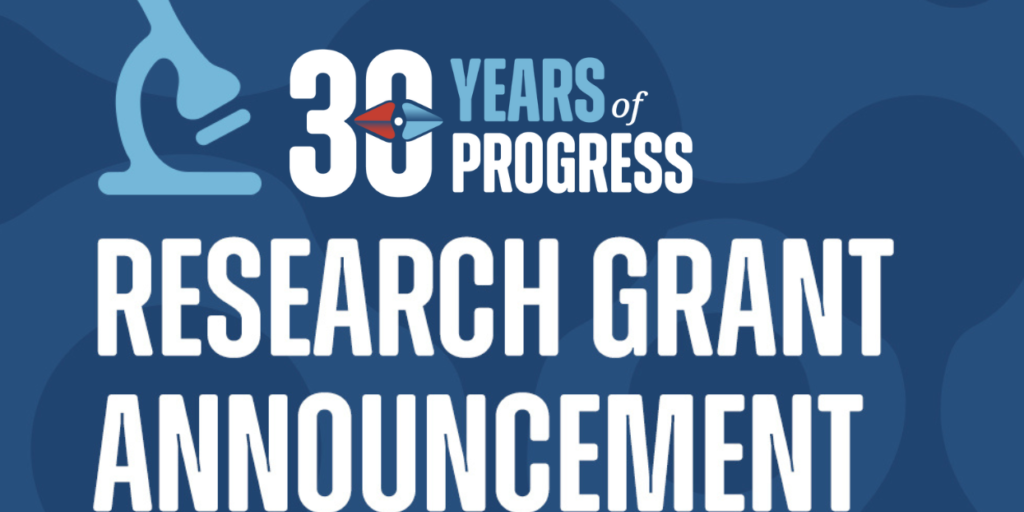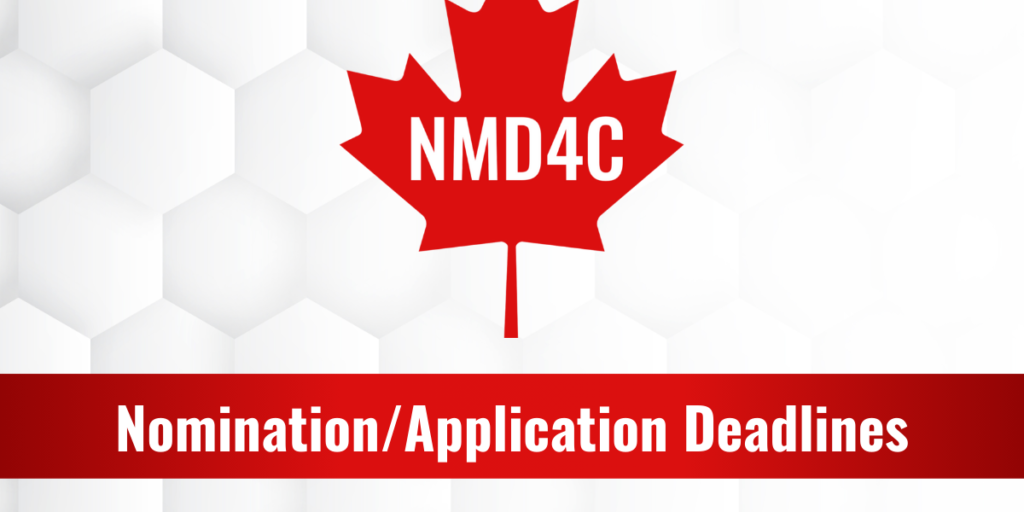2021 NMD4C Year in Review
The NMD4C wrapped up its 2nd Annual Investigator meeting on Monday, November 29th 2021. This virtual conference served as an opportunity for the network’s investigators to come together and discuss the progress made towards the network’s goals over the past 12 months, with the leaders of the seven working groups presenting the results of their work. With the calendar year wrapping up, it is the perfect opportunity to reflect on all the inspiring progress the NMD4C has made over the past year in pursuit of the network’s goals. Thank you to our steering committee, our working group members and leaders, and our partner Muscular Dystrophy Canada who are an integral part of every working group!
NMD4C Membership
The NMD4C grew from having 311 members in 2020 to 432 in 2021! Of these 432, there are:
- 138 clinicians,
- 151 researchers,
- 51 individuals and families living with NMDs
- 15 industry
- 15 patient advocates
NMD4C Advocacy
In partnership with MDC, Jesse’s Journey and other partner organizations, the NMD4C actively engaged in advocacy for access to treatment and therapies for individuals living with NMDs, and provided input and feedback to decision makers to help inform decisions related to access to treatments and therapies which included a response to the Federal Government on Building a National Strategy for High-Cost Drugs for Rare Diseases, and clinician group input letters to CADTH. The network is also a member of the International Myotonic Dystrophy Awareness day alliance, which thanks to the efforts of MDC and the Myotonic Dystrophy Foundation, saw in 2021 the Manitoba provincial government officially proclaim September 15th to be International Myotonic Dystrophy Awareness Day!
NMD4C Webinars
The NMD4C provided 13 CPD-accredited hours of educational webinars, averaging 49 attendees and hosting 601 attendees across all of 2021. The response from the community has been exceedingly positive, with the majority of attendees indicating overall satisfaction or strong satisfaction with the series, and the series holds a strong net promoter score in that most audience members would be very likely to recommend the webinars to a colleague.
The network also participated in the inaugural Defeat Duchenne Canadian Conference Addressing Standards of Care in Canada in partnership with Jesse’s Journey and MDC; the three-part conference, which included:
- Surveys developed for the multi-disciplinary care teams (163 respondents) and individuals affected by DMD (94 respondents) to capture the Canadian standard of care landscape
- 18 CPD-accredited hours over 3 sessions, 6 days, and 9 topics
- 218 participants and 55 speakers attended the conference over the three sessions
Curriculum Development
In 2021, under the leadership of Dr. Hernan Gonorazky, the curriculum development working group submitted an application for official recognition of Neuromuscular Medicine as an Area of Focus Competence by the Royal College of Physicians and Surgeons of Canada. For this application, the network has also united the applicable Canadian neuromuscular stakeholders, receiving the support of the CNS, CSCN, CACN and CAMPR. This incredible effort is thanks to Drs. Hernan Gonorazky, Aaron Izenberg, Jocelyn Zwicker, Christen Shoesmith, Theo Mobach, Patrick Frosk, Kristine Chapman, and all the neuromuscular fellowship program directors across Canada.
The curriculum development group also conducted a landscaping exercise to gather information on the existing Canadian neuromuscular fellowship programs which are presented in the Fellowship Map, and hosted four CPD-accredited neuromuscular mystery case rounds over the past year. Chaired by Drs. Hernan Gonorazky, Aaron Izenberg and Christen Shoesmith, these rounds allow a platform for neuromuscular fellows to present case rounds to their peers and senior clinicians.
Outputs:
- Applied to the Royal College to gain recognition of Neuromuscular Medicine as an Area of Focused Competency
- Hosted four CPD-accredited neuromuscular mystery case rounds presented by Canadian fellows and fellowship directors.
- Neuromuscular Fellowship Map posted on NMD4C website
Expert Patient Capacity Building (EPCB)
The EPCB team welcomed Patricia Mortenson in April 2021 to the role of project coordinator. The group pursued a landscaping exercise to gather the available resources for patient-oriented research (POR) and best practices, and has begun preparing a database to share this information, expected to be launched on the NMD4C website in early 2022. The group also began work on developing a patient-oriented framework for neuromuscular-specific training, with strong progress made in this initiative. The group will also provide opportunities for patient partners to engage in network research projects: Dr. Cynthia Gagnon’s comprehensive natural history of OPMD study, and will be included in an upcoming SMA decision-making project.
Outputs:
- Landscape work to collect and centralize the available resources for POR and current best practices
- Recruited eight patient partners to work with the EPCB group
- Training for the entire team (staff, investigators, partners) in POR
- Began work on a framework for NM-specific training
- Provided opportunities for patient partners to engage in network research projects
Early-Career
The NMD4C Early-Career (EC) working group works within the early-career neuromuscular community to provide a wide variety of leadership, training, and networking opportunities.In 2021, the EC group welcomed two new early-career members to its leadership group this year with both Drs. Natasha Chang and Cam-Tu Nguyen joining the team. The group also facilitated early-career members Drs. Kessen Patten and Mona Hnaini in joining the knowledge translation working group and Drs. Elise Duchesne and Gerald Pfeffer in joining the biobanking working group. These appointments were made with the development of expertise and leadership for EC members in mind, and to provide a broader perspective on the issues faced by early-career clinicians and researchers in the field.
To increase the availability of training for early-career neuromuscular clinicians, the network together with MDC and the Canadian Society of Clinical Neurophysiologists (CSCN) launched a funding competition to award three new national clinical fellowship awards in neuromuscular medicine and electromyography, made possible by the generous support of MDC and an unrestricted educational grant from Grifols Canada. To increase the availability of training for early-career neuromuscular researchers, the network together with MDC were also able to provide two funding opportunities for postdoctoral fellowship research funding.
Outputs:
- Provided three clinical fellowship funding opportunities in partnership with MDC and the CSCN, for a total of $230 000 CAD available.
- Provided two postdoc fellowship funding opportunities in partnership with MDC, with a total of $80 000 CAD available.
- Appointed 6 early-career members to working group leadership roles, with early-career representation now on 30% of all working groups.
- One CPD-accredited webinar chaired by an early-career member
- Early-career members presented at 30% of all webinars in 2021
- Grew early-career membership by 25% to 109 total members, now making up 25% of total network membership.
- Published at least one early-career blog or member profile per month in 2021
- Hosted two events for early-career networking in 2021, with the Early-Career Forum in February and NMD4C Members’ Networking Event in November.
Knowledge Translation
The Knowledge Translation (KT) team is involved in all areas of network communications, including the network’s monthly newsletter, our Twitter, Facebook, and LinkedIn channels, and supports other working groups in their knowledge translation strategies. The KT team works to provide best practices for emerging treatments, and in combination with leading Canadian experts the team has helped to publish an open-access Guidance on gene replacement therapy in SMA that has been downloaded over 300 times since its publication in June of 2021. The group also seeks to provide training and education opportunities for the network’s members to learn best practices in developing and implementing KT strategies, and has begun a three-part webinar series to showcase how KT strategies can be implemented across the span of a research project.
Outputs:
- Published a Guidance on gene replacement therapy in SMA: a Canadian Perspective
- Conducted a landscaping study for Canadian neuromuscular clinical practice guidelines
- Hosted the webinar “Setting up the Basics for a Successful KT Plan” as the first of a three-part KT series
- 57% growth in followers on average across all social media channels
- Newsletter shared with members on a monthly basis
- Began production of a clinical care guideline adaptation for GPs
- Began work to produce infographics to inform clinicians about knowledge gaps and identity best resources for clinical practice guidelines
Biobanking
The NMD4C recruited Dr. Jason Karamchandani of McGill University and the C-BIG repository in early 2021 to lead the network’s biobank working group to unite the Canadian neuromuscular biobanking community and work towards building a centralized virtual biobanking catalogue. In 2021, the biobanking team formed a working group with representatives from eight Canadian biobanks. This group provides invaluable feedback on biobanking activities, including harmonizing data elements from different catalogues, the C-BIG neuromuscular instrument, the digital consent module, and a material transfer agreement framework that abides by provincial and institutional standards. The working group is also in the process of hiring a biobank developer to build the virtual catalogue, and have secured additional funding to develop a digital consent tool to enable the use of clinical samples in a research capacity.
Outputs:
- Published a list of Canadian biobanks currently collecting neuromuscular samples
- Created a working group with eight biobank directors, with standing quarterly meetings
- Secured additional funding for the biobank developer to build a clinical consent framework alongside NMD4C virtual catalogue
- Began process of harmonizing data elements for aggregation in NMD4C virtual catalogue
- Began process of consulting biobank directors on inter-site transfer agreement framework
Clinical Trials
In 2021, the clinical trial working group hired Bonnie Wooten as the network’s clinical trial (CT) Concierge to act as an information broker for clinical trials for all Canadian clinical care sites and to support the NMD4C community with consistent knowledge, awareness, and access to information across sites. This position is independently objective and designed to serve as an impartial resource, not funded by industry and is for all neuromuscular stakeholders. A key priority of the concierge is to work with Investigators to develop solutions to barriers associated with bringing neuromuscular clinical trials to Canada. Bonnie has been working to forge connections with the various clinical trial sites across Canada, and has worked closely with national partners MDC and Jesse’s Journey, the Canadian Neuromuscular Disease Registry, pharmaceutical companies, and has also connected with international organizations such as the Clinical Trial Site Registry (CTSR) of Freiburg, Germany.
Outputs:
- NMD4C concierge web page launched (up to 6 CT requests received per week)
- Formal partnerships established with the CTSR and CNDR (requests streamlined including feasibility and recruitment requests)
- CTSR membership grew from 15 to 18 Canadian sites
- Half of all Canadian sites registered with CTSR also consented to concierge support
- Connections established with sponsor/Industry representatives
- Landscape of Canadian trial sites and training opportunities
- Hosted webinar in partnership with CTSR providing an overview for site participation with the registry
Patient Registries
In 2021, the NMD4C and partner the Canadian Neuromuscular Disease Registry (CNDR), whose network of site investigators and research coordinators are an ideal model for rare NMD registries globally, continued to collaborate on several initiatives: incorporating FAIR data principles (Findable, Accessible, Interoperable, Reusable) into datasets, updating existing disease modules, and supporting academic and industry-led research through the use of its datasets and resources. The CNDR also launched a direct-to-patient survey to collect data on patient preferences for interfacing with the CNDR, including the frequency, duration, and modality of interaction. This survey will remain open until the end of 2021.
Outputs:
- Began FAIRifiation of a CMS registry as a pilot study
- Developed a CMS dataset as a demonstration project, in alignment with EURO-NMD to allow international comparisons
- Developed a draft dataset for MTM-CNM
- Improved uptake of CNDR by having more than one new investigator utilizing the CNDR.
- Deployed direct-to-patient survey to gather patient perspectives (data collection closing end of 2021)
- 29 projects in 2021 involving CNDR data
- Presented “Voice in Research: Participating in Patient Registries”, a webinar overviewing the CNDR, and providing information on how to participate
Thank you to everyone who has been involved in any of the network’s initiatives in 2021; the network would truly not be where it is today without all of the hard work of its members – we are excited and grateful to have the opportunity to continue working towards the network’s goals in 2022. Stay tuned for our January newsletter to hear about our plans for the coming year!
